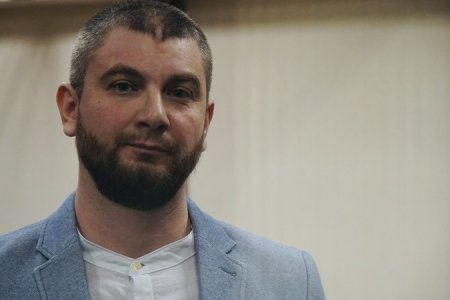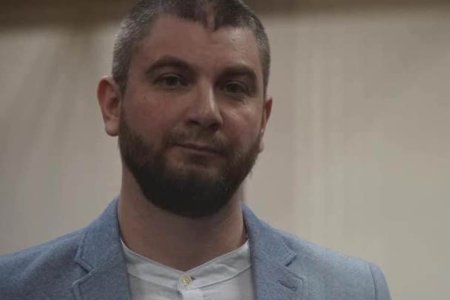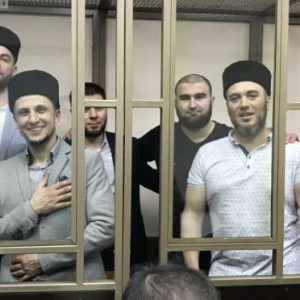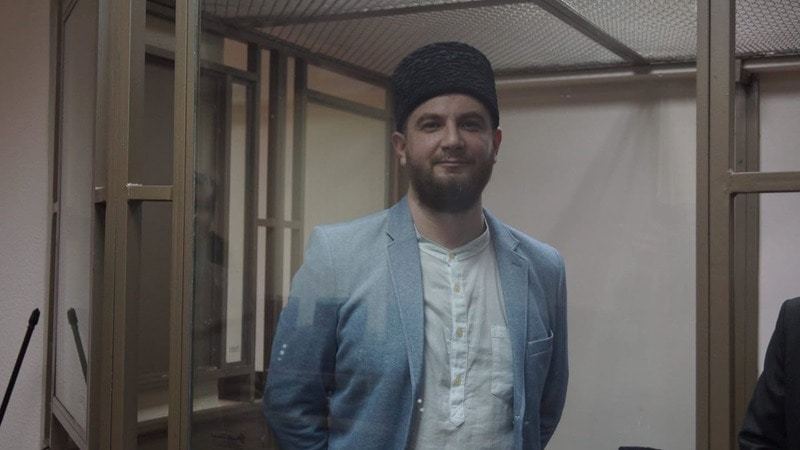
Ernes Ametov has been sentenced to 11 years’ imprisonment two years after the 37-year-old Crimean Tatar civic journalist and recognized political prisoner was acquitted on identical charges and released from custody. There were no new circumstances to justify a ‘retrial’, and it is unclear solely whether the acquittal was always intended as temporary, or whether Russia’s FSB used its influence to get it overturned. The original trial of Ametov and seven other civic journalists and activists had already attracted international condemnation, and it is possible that the acquittal was intended to imitate a real trial.
FSB pressure cannot, however, be excluded. During the penultimate hearing, defence lawyer Dzhemil Temishev said that it was a great honour to defend a man like Ernes Ametov who had been placed under huge pressure to give false testimony against other Crimean Tatars. Ametov had stood firm and refused such demands. The defence was convinced, Temishev continued, that it was precisely because of Ametov’s courage and integrity that he was once again in a cage before the court.
Ametov’s acquittal was revoked on 14 March 2022, 18 months after his acquittal on 16 September 2020. The shock move came at the end of 45 hearings before the Military Court of Appeal in Vlasikha in the appeal over the huge sentences (up to 19 years) passed against the other seven civic journalists and activists. The length of the appeal process, it transpired, was linked solely with the determination of the defendants themselves and their lawyers to demonstrate the fatal flaws in all parts of their ‘trial’. The Military Court of Appeal ignored all of the evidence of falsifications, of seriously flawed ‘expert assessments’, etc. and left virtually all of the sentences unchanged, with only one very minor reduction. It turned out, however, that the prosecutor Yevgeny Sergeevich Kolpikov (who had demanded a 17.5 year sentence) had issued an appeal against the acquittal of Ernes Ametov, and it was this that the court allowed. The acquittal was revoked and ‘the case’ sent back for ‘retrial’ at the same notorious Southern District Military Court in Rostov (Russia) but under a different panel of judges. Ametov was rearrested on 12 May 2022, and has been in custody ever since.
There were no grounds for revoking the acquittal, nor for once again imprisoning a person who had been living peacefully with his family. Nevertheless, on 26 December 2022, the same prosecutor Yevgeny Kolpikov now demanded an 18.5 year sentence. On 29 December, the new panel of ‘judges’ – Aleksei Abdulmazitovich Magomadov (presiding); Kirill Nikolaevich Krivtsov; and Vladimir Yevgenievich Tsybulnik – passed a new sentence, of 11 years. Ametov (like the other seven men) remained accused only of conversations on religious and political subjects, with no recognizable crime, and no additional evidence had been provided. The only difference was that the judges had understood that a conviction and long sentence were demanded of them, and, in contrast to Ametov, they obliged.
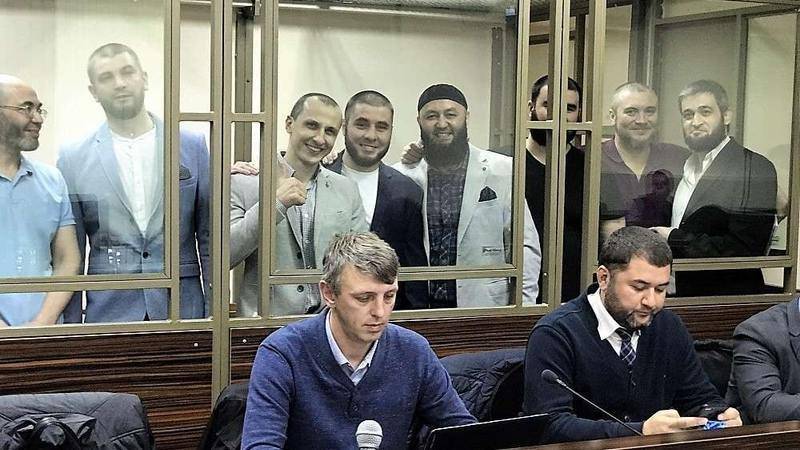
Ernes Ametov was originally arrested on 11 October 2017 as part of Russia’s first major offensive against the Crimean Solidarity human rights initiative, and the civic journalists and activists who ensure that the world hears about Russia’s repression in occupied Crimea. Four civic journalists were taken prisoner that day: Ernes Ametov (b. 1985); Marlen (Suleiman) Asanov (b. 1977); Timur Ibragimov (b. 1985) and Seiran Saliyev (b. 1985), and also two civic activists Memet Belyalov (b. 1989) and Server Zekiryaev (b. 1973). Although it was clear then that Russia was seeking to silence the human rights movement in occupied Crimea, it was the arrest on 21 May 2018 of Crimean Solidarity Coordinator Server Mustafayev (b. 1986) (together with Edem Smailov (b. 1968)) that provoked the most international condemnation.
The charges
The men were essentially accused only of unproven ‘involvement’ in Hizb ut-Tahrir, a peaceful Muslim organization which is legal in Ukraine and which is not known to have committed acts of terrorism anywhere in the world. There were no grounds for the Russian Supreme Court ruling which declared Hizb ut-Tahrir ‘terrorist’, and it is likely that the move was aimed at enabling Russia to extradite victims of religious persecution back to Uzbekistan. Russia is also in grave breach of international law by applying its own legislation on occupied territory.
In occupied Crimea, the Russian FSB are increasingly using such prosecutions as a weapon against civic activists and journalists, particularly from Crimean Solidarity.
Initially, the FSB designated only Marlen Asanov as ‘organizer of a Hizb ut-Tahrir group’ under Article 205.5 § 1 of Russia’s criminal code, with the other men all charged with ‘involvement’ in such an alleged group (Article 205.5 § 2). Such classifications seem entirely arbitrary but make a major difference to the sentence passed, with all those accused of being ‘organizers’ getting 17-20-year sentences. In February 2019 it was announced that Belyalov and Ibragimov were now also facing the ‘organizer’ charge.
All eight men were also charged (under Article 278) with ‘planning to violently seize power’. This new charge also appeared only in February 2019, with no attempt ever made to explain how the men were planning such a ‘violent seizure’. The charge only highlights the shocking cynicism of any such ‘terrorism’ charges when the only things ‘found’ (and very often brought by the FSB) when armed searches were carried out of the men’s homes were religious books, with no weapons, and no evidence of plans to commit any crime, let alone one of violence.
The ’evidence’
The main ‘material evidence’ was in the form of three illicitly taped conversations in a Crimean Mosque. These were supposedly understood to be ‘incriminating’ by Nikolai Artykbayev, a Ukrainian turncoat, now working for the Russian FSB, although the latter does not know Crimean Tatar (or Arabic). His transcript, which was of highly questionable accuracy, was then sent to three supposed ‘experts’: Yulia Fomina and Yelena Khazimulina, and Timur Zakhirovich Urazumetov. Without any professional competence to back their assessments, all of the three ‘found’ what the FSB was looking for. During the original trial, the defence called in Dr Yelena Novozhilova, an independent and experienced forensic linguist, who gave an absolutely damning assessment of the linguistic analysis produced by the two linguistic ‘experts’ (Fomina and Khazimulina).
The most shocking aspect of these trials, one in which the prosecutors and judges are fully complicit, is the use of ‘anonymous witnesses’. Secrecy over the identity of these prosecution ‘witnesses’ is invariably allowed, despite the lack of any evidence that the men would be in danger if they appeared openly. In many cases, it is likely that the secrecy is because these alleged ‘witnesses’ do not in fact know the defendants, and have simply been intimidated or threatened into providing false testimony. It is invariably these ‘secret witnesses’ who testify that the defendants are members of Hizb ut-Tahrir.
The ‘judges’ are well aware that these supposed anonymous witnesses are essentially working for the prosecution, as evidenced by the number of times they prevent the defence from asking questions which show the alleged ‘witnesses’ ignorance of anything but the ‘incriminating’ details which they always know off by heart.
This case was somewhat different for a specific reason, namely that both ‘secret witnesses’ were, in fact, recognized, and their reasons for collaborating with the FSB entirely clear to the court. Konstantin Tumarevich is a Latvian citizen and fugitive from justice who could not risk being sent back to Latvia after his passport expired. He is believed to have been used by the FSB in several prosecutions. Narzulayev Salakhutdin was also living in occupied Crimea without the proper documents and did not want to be forcibly returned to his native Uzbekistan.
These men gave testimony that in many places was demonstrably false, yet presiding judge Rizvan Zubairov constantly blocked attempts by the defendants and their lawyers to ask questions that would not have revealed their identity, merely the fact that they were lying.
On 18 September 2020, Rizvan Zubairov, together with Roman Saprunov; and Maxim Nikitin from the Southern District Military Court convicted seven of the men, and acquitted Ametov. The sentences, all in the harshest of Russian penitentiary institutions, were horrific: Crimean Solidarity civic journalist Marlen Asanov was sentenced to 19 years; Crimean Solidarity activist Memet Belyalov - 18 years; Crimean Solidarity civic journalist Timur Ibragimov – 17 years; Crimean Solidarity Coordinator and journalist Server Mustafayev - 14 years; Crimean Solidarity civic journalist Seiran Saliyev - 15 years (reduced at appeal to 14 years); Edem Smailov, the leader of a religious community - 13 years and Crimean Solidarity volunteer Server Zekiryaev – 13 years.
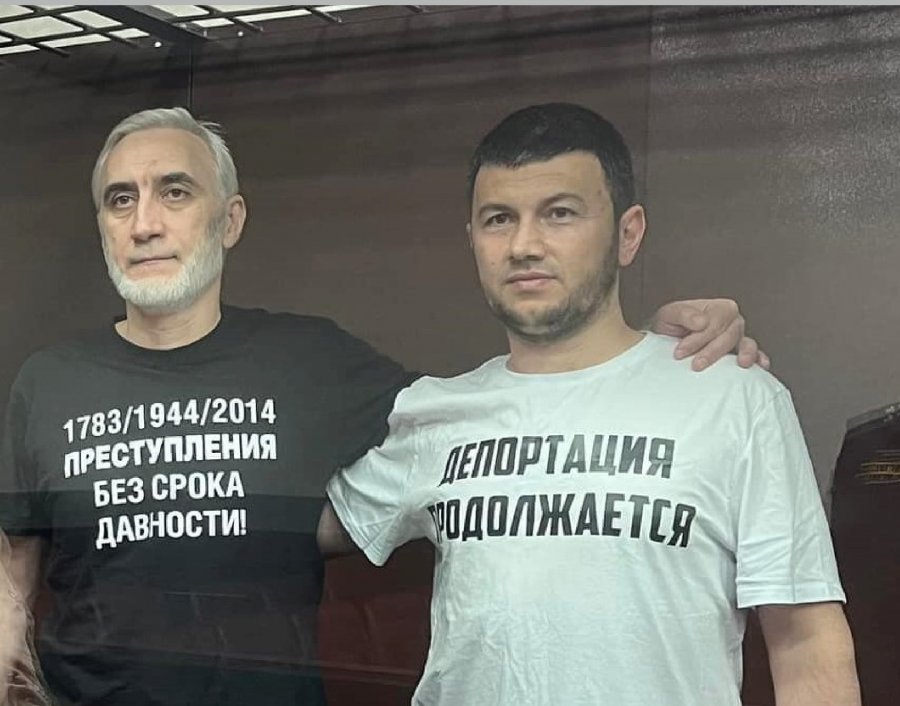
On 8 July 2022, two other Crimean Tatar civic activists - Oleh (Ali) Fedorov (b. 1970) and Ernest Ibragimov (b. 1981) were sentenced to 13 years in a ‘trial’ based on the same illicitly taped conversations, dodgy ‘expert’ assessments and ‘secret witnesses’.
See: Russia copy-pastes first attack on Crimean Tatar activists after 4 years for new 13-year sentences
These prosecutions are known to bring the FSB promotion and / or bonuses and, certain of their impunity, they are increasingly using the same flagrantly flawed material for multiple prosecutions. And, as in this case and the earlier trial of Ruslan Zeytullaev, until they get the sentence they want.
Please write to Ernes Ametov and, if possible, to some of the other men!
The letters tell them and Moscow that they are not forgotten and that Russia’s persecution and the fate of its victims are under scrutiny. Letters need to be in Russian, handwritten, and on ‘safe’ subjects. If that is a problem, use the sample letter below (copying it by hand), perhaps adding a picture or photo. Do add a return address so that the men can answer.
Sample letter
Привет,
Желаю Вам здоровья, мужества и терпения, надеюсь на скорое освобождение. Простите, что мало пишу – мне трудно писать по-русски, но мы все о Вас помним.
[Hi. I wish you good health, courage and patience and hope that you will soon be released. I’m sorry that this letter is short – it’s hard for me to write in Russian., but you are not forgotten. ]
Addresses
Ernes Ametov
344010, Россия, Ростов-на-Дону, ул. Максима Горького, 219 СИЗО-1.
Аметову, Эрнесу Сейяровичу, 1985 г.р.
[In English: 344010 Russian Federation, Rostov on the Don, 219 Maxim Gorky St, SIZO-1
Ametov, Ernes Seiiarovych, b. 1985]
Marlen Asanov
431120 Россия, Зубово-Полянский район, п. Сосновка, ул. Центральная, д. 2.,ФКУ ИК-7 УФСИН России по Республике Мордовия
Асанову, Марлену Рифатовичу, 1977 г. р
[In English: 431120, Russia, Zubovo-Polyansky raion, Sosnovka, ul. Tsentralnaya, No. 2, IK-7
Asanov, Marlen Rifatovich, b. 1977 ]
Memet Belyalov
175130, Россия, рп. Парфино, ул. Народная, зд. 9, ФКУ ИК-9 Новгородская обл.,
Белялову, Мемету Решатовичу, 1989 г.р.
[In English: 175130, Russia, Parfino, ul. Narodnaya, building No. 9, IK-9
Belyalov, Memet Reshatovich, b. 1989 ]
Timur Ibragimov
391825, Россия, Рязанская область, Скопинский район, с. Клекотки, ФКУ ИК-5
Ибрагимову, Тимуру Изетовичу, 1985 г.р.
[In English: 391825, Russia, Ryazan oblast, Skopinsky raion, Klekotki, IK-5
Ibragimov, Timur Izetovich, b. 1985 ]
Server Mustafayev
392000, Россия, Тамбов, ул. Мичуринская, д. 57, ФКУ ИК-1
Мустафаеву, Серверу Рустемовичу, 1986 г.р.
[In English: 392000, Russia, Tambov, ul. Minchurinskaya, No. 57, IK-1
Mustafayev, Server Rustemovich, b. 1986 ]
Seiran Saliyev
301470, Россия, Тульская область, г. Плавск, пос. Белая Гора ФКУ ИК-4
Салиеву, Сейрану Алимовичу, 1985 г.р.
[In English: 301470, Russia, Tula oblast, Plavsk, Byelaya Gora, IK-4
Saliyev, Seiran Alimovich, b. 1985 ]
Edem Smailov
156522 Россия, Костромская обл., Костромской район, пос. Бычиха-12, ФКУ ИК-7
Смаилову, Эдему Назимовичу, 1968 г.р.
[In English: 156522, Russia, Kostroma oblast, Kostromsky raion, Bychikha-12, IK-7
Smailov, Edem Nazimovich, b. 1968 ]
Server Zekiryaev
301781 Россия, Тульская область, г. Донской, мкр. Комсомольский, пр-д Димитрова, 1, ФКУ ИК-1, ,
Зекирьяеву, Серверу Зекиевичу, 1973 г.р.
[In English: 301781, Russia, Tula oblast, Donskoy, Komsomosky, Dimitrova 1, IK-1
Zekiryaev, Server Zekievich, b. 1973 ]
Oleh Fedorov
346408 Россия, Ростовская область, г. Новочеркасск, ул. Украинская №1, ФКУ СИЗО-3
Фёдорову, Олегу Владимировичу, г.р. 1970
[In English: 346408 Russian Federation, Rostov oblast, Novocherkassk, ul. Ukrainskaya, No. 1, SIZO-3
Fedorov, Oleg Vladimirovich, b. 1970 ]
Ernest Ibragimov
346408 Россия, Ростовская область, г. Новочеркасск, ул. Украинская №1, ФКУ СИЗО-3
Ибрагимову, Эрнесту Ильясовичу, г.р. 1981
[In English: 346408 Russian Federation, Rostov oblast, Novocherkassk, ul. Ukrainskaya, No. 1, SIZO-3
Ibragimov, Ernest Ilyasovich, b. 1981 ]
